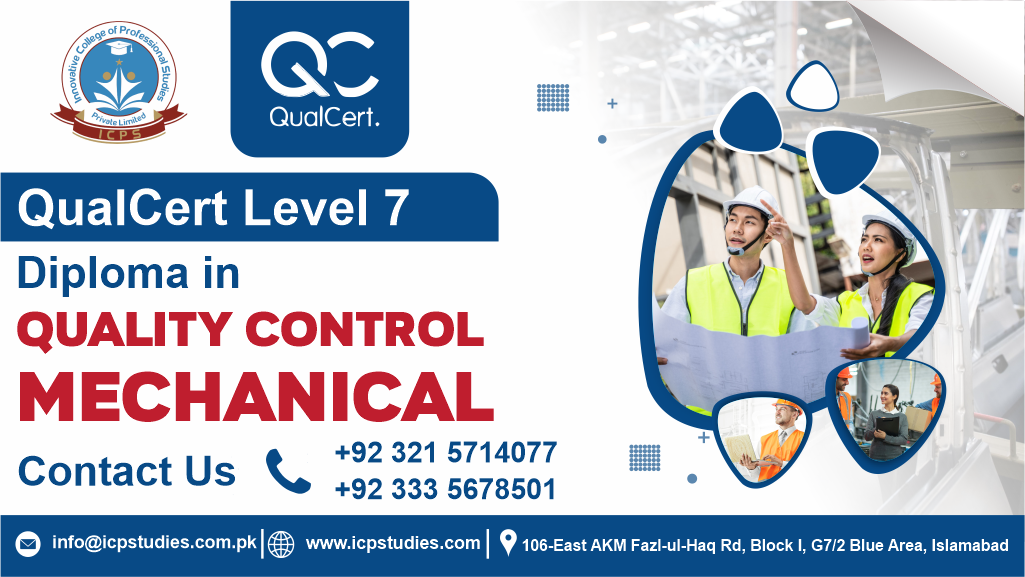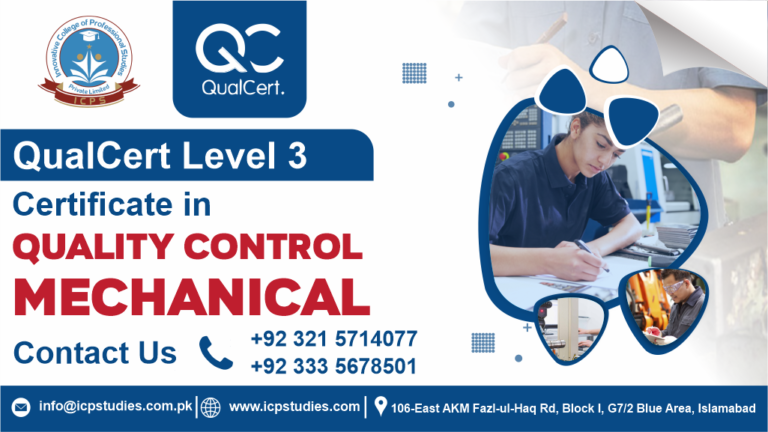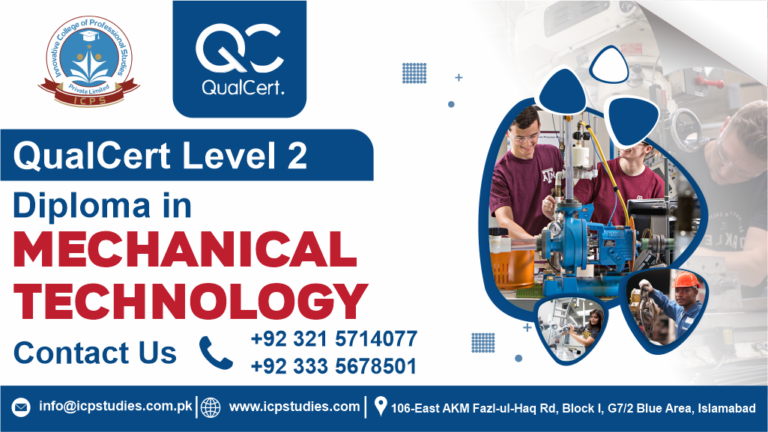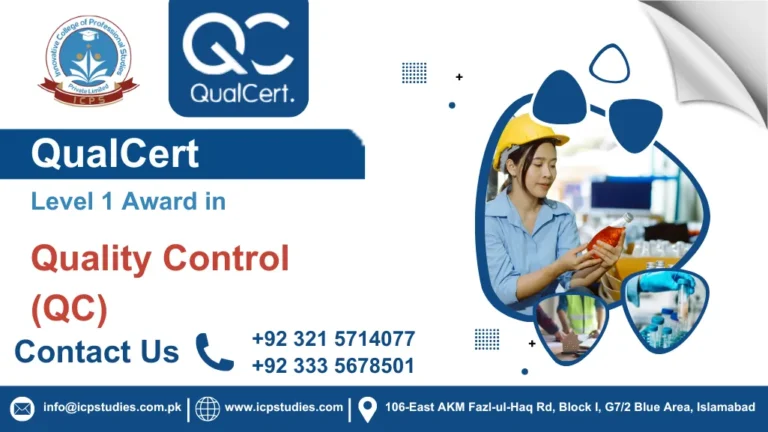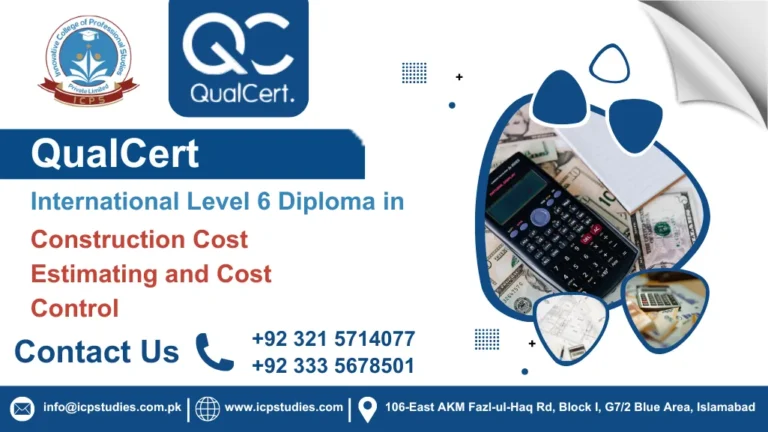In today’s competitive and ever-evolving mechanical engineering industry, maintaining high standards of quality is crucial for success. The Level 7 Diploma in Quality Control (QC) Mechanical is a specialized qualification designed for professionals aiming to enhance their skills and knowledge in quality management within the mechanical sector. This advanced-level course equips learners with the technical expertise and strategic insights needed to manage and improve quality control systems in manufacturing and engineering settings.
The Level 7 Diploma in Quality Control (QC) Mechanical covers the principles and practices essential for ensuring the consistency, reliability, and safety of mechanical systems and products. The course blends theoretical knowledge with practical application, focusing on advanced quality management techniques used in mechanical industries such as manufacturing, automotive, aerospace, and construction.
The Level 7 Diploma in Quality Control (QC) Mechanical is an essential qualification for professionals who want to master quality control within the mechanical engineering field. With a strong focus on both technical knowledge and leadership skills, this course will prepare you to drive continuous improvements in quality, reduce waste, and ensure compliance with industry standards. By the end of the course, you’ll have the skills and qualifications to lead high-level quality control operations, giving you a competitive edge in a dynamic industry.
Are you ready to elevate your career in quality control? Enroll in the Level 7 Diploma in Quality Control (QC) Mechanical today and take the next step toward becoming an expert in mechanical quality management!
All About Level 7 Diploma in Quality Control (QC) Mechanical
Course Overview
In the mechanical engineering field, ensuring the reliability and safety of products through effective inspection and testing is crucial. The Inspection and Testing Methods module of the Level 7 Diploma in Quality Control (QC) Mechanical focuses on equipping you with the knowledge and practical skills required to carry out a wide range of inspection and testing procedures. This course will teach you how to utilize both conventional and advanced testing techniques to evaluate the mechanical properties of materials, the precision of manufactured components, and overall system performance.
Throughout this module, you will explore various non-destructive testing (NDT) methods, dimensional measurement techniques, and material testing protocols used to detect defects, ensure compliance with specifications, and maintain high product standards. This course emphasizes practical application, allowing you to implement these techniques to solve real-world quality control challenges.
By the end of the course, you will be equipped to perform detailed inspections, analyze test results, and make informed decisions to ensure the highest quality and performance in mechanical engineering projects. Whether you’re working in manufacturing, automotive, aerospace, or any other mechanical field, mastering these testing methods is essential for maintaining quality and safety in your products.
Study Units
- Advanced Quality Control Techniques
- Quality Management Systems
- Six Sigma and Lean Manufacturing
- Total Quality Management (TQM)
- Root Cause Analysis
- Continuous Improvement Processes
- Quality Control in Mechanical Systems
The Level 7 Diploma in Quality Control (QC) Mechanical is an advanced qualification designed for individuals with a solid foundation in mechanical engineering or quality management. To ensure that participants are well-prepared for the course content, the following entry requirements apply:
- Academic Qualifications:
- A Bachelor’s degree in Mechanical Engineering, Manufacturing Engineering, or a related field is typically required.
- Alternatively, candidates with an equivalent Level 6 qualification (such as a Diploma or Higher National Diploma) in a relevant discipline may be considered.
- Professional Experience:
- Ideally, applicants should have at least 2–3 years of professional experience in mechanical engineering, quality control, or a related area. This experience will ensure that participants can relate theoretical knowledge to practical, real-world scenarios.
- Experience in quality management, process improvement, or product inspection is particularly beneficial.
- Knowledge of Basic Quality Control Concepts:
- A foundational understanding of quality control principles and practices is recommended. This includes familiarity with concepts such as statistical process control (SPC), basic inspection techniques, and quality assurance processes.
- English Language Proficiency:
- As the course is delivered in English, applicants must demonstrate proficiency in the English language. This may be through previous qualifications or, if necessary, a language proficiency test (e.g., IELTS, TOEFL).
- Motivation and Commitment:
- Given the advanced level of this diploma, candidates should be highly motivated and committed to advancing their careers in quality control and mechanical engineering. A strong desire to enhance leadership skills and quality management expertise is key to success in the program.
Note: Applicants who do not meet the exact entry requirements but have substantial relevant experience in the mechanical or quality control field may still be considered on a case-by-case basis.
If you’re passionate about elevating your career and advancing in the field of quality control within mechanical engineering, this course will provide you with the expertise needed to become a leader in the industry.
The Level 7 Diploma in Quality Control (QC) Mechanical is designed for professionals seeking to deepen their expertise in quality management within the mechanical engineering field. This advanced qualification is ideal for individuals who already have a solid foundation in engineering or quality control and are looking to take their skills and careers to the next level. Here’s a breakdown of who would benefit from this course:
1. Mechanical Engineers
- Engineers who want to specialize in quality control and improve their knowledge of advanced testing, inspection methods, and quality management systems within mechanical engineering projects.
- Those aiming to enhance their ability to lead quality control initiatives and contribute to the continuous improvement of products and processes.
2. Quality Control Managers
- Professionals already in quality control roles who want to upgrade their skills to handle more complex and high-level quality management responsibilities in mechanical engineering environments.
- Those looking to develop leadership skills and strategic expertise to manage teams and oversee large-scale quality assurance operations.
3. Manufacturing Managers and Supervisors
- Managers in mechanical manufacturing settings who want to improve quality management processes, optimize production efficiency, and reduce defects in manufacturing.
- Those seeking to integrate advanced quality control techniques into their existing processes for better quality outcomes.
4. Project Managers in Engineering
- Project managers who need a deeper understanding of quality control and assurance within mechanical engineering projects. This course will help them apply quality control measures to ensure that their projects meet industry standards and are delivered without defects.
5. Quality Assurance (QA) Professionals
- QA professionals who want to expand their knowledge of quality control in mechanical engineering, particularly those looking to move into more specialized or senior roles in the quality assurance field.
- Individuals responsible for ensuring compliance with regulatory standards and implementing corrective actions for quality issues.
6. Engineering Consultants
- Consultants who specialize in mechanical engineering or quality management and wish to deepen their expertise in quality control techniques and processes to better serve their clients.
- Those interested in offering high-level advisory services on quality assurance in the mechanical sector.
7. Individuals Looking to Transition into Quality Control
- Professionals with experience in general engineering or related disciplines (e.g., civil engineering, electrical engineering) who wish to pivot into a quality control-focused role in the mechanical industry.
- Those looking to shift into a leadership position in the quality management domain.
8. Aspiring Quality Control Leaders
- Individuals who aspire to move into senior leadership roles in quality control, overseeing organizational quality management systems, improving product quality, and driving operational excellence.
Conclusion
This course is ideal for those who are passionate about quality control, eager to take on leadership roles in the mechanical engineering sector, and want to stay at the forefront of industry best practices. If you have a background in mechanical engineering or quality management and are looking to advance your career and expertise, the Level 7 Diploma in Quality Control (QC) Mechanical will provide you with the advanced knowledge and practical skills needed to succeed in a rapidly evolving industry.
Learning Outcomes
Advanced Quality Control Techniques
Upon completion of this unit, students will be able to:
- Apply statistical process control (SPC) techniques to monitor and regulate production processes.
- Utilize control charts to identify variations and maintain process stability.
- Conduct process capability analysis to evaluate and enhance manufacturing process efficiency.
- Design and implement advanced quality control systems to ensure consistency and reliability of products.
Quality Management Systems
Upon completion of this unit, students will be able to:
- Develop and implement quality management systems in accordance with ISO 9001 standards.
- Plan and execute quality assurance practices that align with organizational goals and meet regulatory requirements.
- Integrate quality management principles into organizational processes to improve overall performance and quality.
Six Sigma and Lean Manufacturing
Upon completion of this unit, students will be able to:
- Apply the Six Sigma DMAIC (Define, Measure, Analyze, Improve, Control) methodology to drive systematic process improvements.
- Implement lean manufacturing tools to identify and eliminate waste, optimizing operational efficiency.
- Leverage Six Sigma and Lean principles to refine processes and achieve higher levels of quality.
Total Quality Management (TQM)
Upon completion of this unit, students will be able to:
- Integrate Total Quality Management (TQM) principles across all organizational levels.
- Foster a customer-centric approach to quality management to enhance customer satisfaction and retention.
- Promote a culture of continuous improvement and active employee involvement in quality initiatives.
Quality Audits and Compliance
Upon completion of this unit, students will be able to:
- Conduct both internal and external quality audits to assess compliance with industry standards and regulations.
- Plan and execute audits efficiently, ensuring proper reporting and follow-up actions are taken.
- Ensure organizational practices adhere to industry standards and regulatory requirements for quality control.
Root Cause Analysis
Upon completion of this unit, students will be able to:
- Use root cause analysis techniques, such as the 5 Whys, fishbone diagrams, and fault tree analysis, to identify and resolve underlying quality issues.
- Systematically investigate and address the root causes of quality problems to prevent recurrence.
- Implement corrective actions to improve product quality and process performance.
Continuous Improvement Processes
Upon completion of this unit, students will be able to:
- Apply continuous improvement methodologies, such as Kaizen and PDCA (Plan-Do-Check-Act), to drive ongoing enhancements in quality and performance.
- Use benchmarking to evaluate and refine quality standards and practices.
- Sustain long-term quality improvements through effective performance evaluation and process management.
Quality Control in Mechanical Systems
Upon completion of this unit, students will be able to:
- Address quality control challenges specific to mechanical systems and components.
- Conduct material testing and analyze mechanical properties to ensure product quality and performance.
- Implement tailored quality control measures for mechanical engineering applications and manufacturing processes.
The Level 7 Diploma in Quality Control (QC) Mechanical is designed for professionals who are dedicated to advancing their expertise in quality control and aim to contribute significantly to the development and maintenance of high-quality mechanical systems and processes.
FAQs Level 7 Diploma in Quality Control (QC) Mechanical

